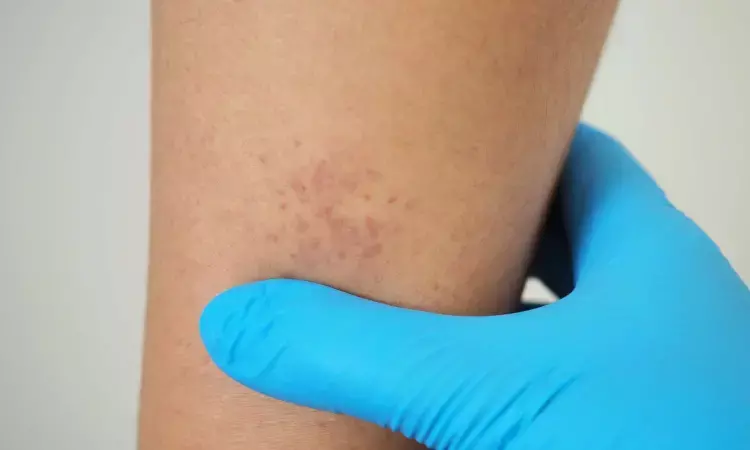- Home
- Medical news & Guidelines
- Anesthesiology
- Cardiology and CTVS
- Critical Care
- Dentistry
- Dermatology
- Diabetes and Endocrinology
- ENT
- Gastroenterology
- Medicine
- Nephrology
- Neurology
- Obstretics-Gynaecology
- Oncology
- Ophthalmology
- Orthopaedics
- Pediatrics-Neonatology
- Psychiatry
- Pulmonology
- Radiology
- Surgery
- Urology
- Laboratory Medicine
- Diet
- Nursing
- Paramedical
- Physiotherapy
- Health news
- Fact Check
- Bone Health Fact Check
- Brain Health Fact Check
- Cancer Related Fact Check
- Child Care Fact Check
- Dental and oral health fact check
- Diabetes and metabolic health fact check
- Diet and Nutrition Fact Check
- Eye and ENT Care Fact Check
- Fitness fact check
- Gut health fact check
- Heart health fact check
- Kidney health fact check
- Medical education fact check
- Men's health fact check
- Respiratory fact check
- Skin and hair care fact check
- Vaccine and Immunization fact check
- Women's health fact check
- AYUSH
- State News
- Andaman and Nicobar Islands
- Andhra Pradesh
- Arunachal Pradesh
- Assam
- Bihar
- Chandigarh
- Chattisgarh
- Dadra and Nagar Haveli
- Daman and Diu
- Delhi
- Goa
- Gujarat
- Haryana
- Himachal Pradesh
- Jammu & Kashmir
- Jharkhand
- Karnataka
- Kerala
- Ladakh
- Lakshadweep
- Madhya Pradesh
- Maharashtra
- Manipur
- Meghalaya
- Mizoram
- Nagaland
- Odisha
- Puducherry
- Punjab
- Rajasthan
- Sikkim
- Tamil Nadu
- Telangana
- Tripura
- Uttar Pradesh
- Uttrakhand
- West Bengal
- Medical Education
- Industry
Eltrombopag Outperforms Standard Therapies for Pediatric Immune Thrombocytopenia in New Trial

USA: Findings from the PINES trial suggest that eltrombopag (Promacta) may offer improved outcomes for children with newly diagnosed immune thrombocytopenia (ITP) compared to standard first-line therapies.
Presented at the 66th American Society of Hematology (ASH) Annual Meeting and Exposition, the trial revealed that eltrombopag significantly increased the rate of durable platelet responses without needing rescue treatments. This was notably superior to standard first-line therapies, which included prednisone, intravenous immunoglobulin (IVIG), or anti-D globulin administered at specified doses.
Data from the PINES trial, presented at ASH 2024, indicate that eltrombopag may surpass the current standard of care in achieving platelet response for children with newly diagnosed pediatric ITP.
"Eltrombopag achieved a sustained platelet response rate of 65%, significantly higher than the 33% observed with standard therapies in children with newly diagnosed pediatric ITP," the researchers reported.
Corticosteroids, intravenous immunoglobulin (IVIg), and anti-D globulin are commonly used as first-line treatments for newly diagnosed immune thrombocytopenia (ITP). Eltrombopag (epag), a thrombopoietin receptor agonist, received FDA approval in 2015 for use in children with chronic ITP. Kristin A. Shimano, University of California San Francisco Benioff Children's Hospital, San Francisco, CA, and colleagues aimed to explore the efficacy of eltrombopag (epag) during the newly diagnosed phase of pediatric ITP, as its effectiveness in this stage remains unknown.
The PINES trial (NCT03939637) is a randomized, open-label, multicenter study sponsored by ICON and funded by Novartis. It included patients aged 1–<18 years with newly diagnosed ITP (≤3 months) and platelet counts <30 × 10⁹/L requiring treatment. Participants were randomized 2:1 to eltrombopag (epag) or one of three standard therapies (prednisone, IVIg, or anti-D globulin).
The primary endpoint was achieving ≥3 of 4 platelet counts >50 × 10⁹/L during weeks 6–12 without rescue treatment. Secondary endpoints assessed bleeding severity, quality of life (QoL), and rescue therapy usage. Statistical methods tested the superiority of epag over standard therapies.
Based on the study, the researchers reported the following findings:
- Primary Endpoint: The eltrombopag (epag) arm had a significantly higher response rate than the standard of care (SOC) (65% versus 33%). The trial was closed early for efficacy following DSMB recommendation.
- Participants: 118 patients (1–<18 years) were included in the intent-to-treat analysis (78 epag, 40 SOC). Median platelet counts at enrollment were 4 × 10⁹/L (epag) and 8 × 10⁹/L (SOC).
- Bleeding Scores: Baseline median WHO bleeding scores were 2 (epag) versus 1 (SOC), and MBS scores were 3 (epag) versus 2 (SOC).
- Rescue Therapy: Fewer patients required rescue therapy in the epag arm (19%) than in the SOC arm (46%).
- Quality of Life (QoL): Both arms showed clinically meaningful QoL improvement based on KIT scores, with no significant differences between groups.
- Adverse Events (AEs): Grade 3+ AEs were reported in 20 patients (6 SAEs) in the epag arm and six patients (3 SAEs) in the SOC arm. Common AEs included headache and epistaxis.
- Severe Cases: There was one intracranial hemorrhage in the epag arm, but there were no thromboembolic events.
- Follow-Up: Participants are completing 12 months of follow-up per protocol
"The findings showed that in children with newly diagnosed ITP needing pharmacologic treatment, epag results in a significantly higher rate of sustained platelet response without the need for rescue therapies compared to standard first-line treatments," the researchers concluded.
Reference: https://ash.confex.com/ash/2024/webprogram/Paper193644.html
Dr Kamal Kant Kohli-MBBS, DTCD- a chest specialist with more than 30 years of practice and a flair for writing clinical articles, Dr Kamal Kant Kohli joined Medical Dialogues as a Chief Editor of Medical News. Besides writing articles, as an editor, he proofreads and verifies all the medical content published on Medical Dialogues including those coming from journals, studies,medical conferences,guidelines etc. Email: drkohli@medicaldialogues.in. Contact no. 011-43720751


